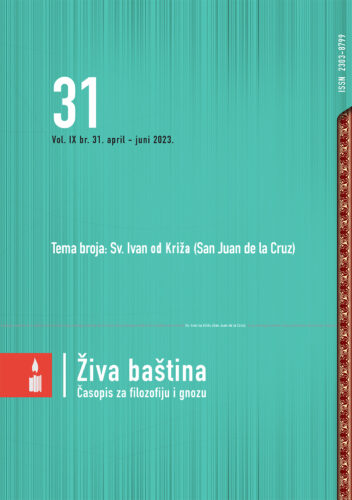UDK 141 Gazali
Među predmetima islamske teologije, kosmologija Gazalija dobila je veliku pažnju na Zapadu. Učenjaci renesanse bili su upoznati s Gazalijevom kritikom filozofskih teorija kauzaliteta u 17. raspravi njegove Nesuvislosti filozofa (Tahafut al-falasifa). Tokom prve polovine 19. stoljeća, kada je počelo zapadno akademsko proučavanje islamske teologije, znanstvenici su došli do zaključka da je u ovom poglavlju Gazali poricao postojanje uzročno-posljedičnih veza. Ta je pozicija bila povezana s očiglednim nedostatkom napretka u znanstvenom istraživanju u muslimanskim zemljama. Ernest Renan je, naprimjer, shvatio Gazalijevu kritiku filozofskih teorija kauzaliteta kao antiracionalističku, mistički nadahnutu opoziciju prirodnim naukama. Ovo je gledište postalo neizmjerno utjecajno među zapadnim intelektualcima i još uvijek je široko rasprostranjeno. Kada je Gazalijeva Niša svjetlosti (Mishkat al-anwar) postala dostupna tokom prvih desetljeća 20. stoljeća, zapadni su tumači shvatili da barem ovdje Gazali ne poriče postojanje uzročno-posljedičnih veza. Tokom većeg dijela 20. stoljeća zapadni znanstvenici favorizirali su objašnjenje koje Gazaliju pripisuje dva različita seta učenja, jedno ezoterično i drugo egzoterično. Posljednja desetljeća 20. stoljeća iznjedrila su dvije vrlo različite interpretacije Gazalijeve kosmologije u djelima Michaela E. Marmure i Richarda M. Franka. Obojica su odbacili da je Gazali imao egzoterična i ezoterična gledišta. Marmura je objasnio kauzalne veze kao izravna Božija djelovanja, a Frank ih je smatrao izrazima sekundarne kauzalnosti. Njihovi su doprinosi doveli do razumijevanja na Zapadu da Gazali nije poricao postojanje uzročno-posljedičnih veza i da se ne može smatrati protivnikom prirodnih nauka u islamu.
Ključne riječi: Gazali, kosmologija, kauzalnost, okazionalizam, Ernest Renan.
The Western Reception of al-Ghazālī’s Cosmology from the Middle Ages to the 21st Century
Frank Griffel
Abstract
Among subjects of Islamic theology, the cosmology of al-Ghazālī has received much attention in the West. Scholars in the Renaissance were familiar with al-Ghazālī's critique of philosophical theories of causality in the 17th discussion of his Incoherence of the Philosophers (Tahāfut al-falāsifa). During the first half of the 19th century, when the Western academic study of Islamic theology began, scholars came to the conclusion that in this chapter, al-Ghazālī denied the existence of causal connections. That position was connected to an apparent lack of progress in scientific research in the Muslim countries. Ernest Renan, for instances, understood al-Ghazālī's critique of philosophical theories of causality as an anti-rationalist, mystically inspired opposition to the natural sciences. This view became immensely influential among Western intellectuals and is still widely held. When al-Ghazālī's Niche of Lights (Mishkāt al-anwār) became available during the first decades of the 20th century, Westem interpreters understood that at least here al-Ghazālī does not deny the existence of causal connections. During much of the 20th century, Western scholars favored an explanation that ascribes two different sets of teaching to al-Ghazālī, one esoteric and one exoteric. The last decades of the 20th century saw two very different interpretations of al-Ghazālī's cosmology in the works of Michael E. Marmura and Richard M. Frank. Both rejected that al-Ghazālī held exoteric and esoteric views. Marmura explained causal connections as direct actions of God and Frank regarded them as expressions of secondary causality. Their contributions led to the understanding in the West that al-Ghazālī did not deny the existence of causal connections and cannot be regarded as an opponent of the natural sciences in Islam.
Keywords: al-Ghazālī, Cosmology, Causality, Occasionalism, Ernest Renan.

